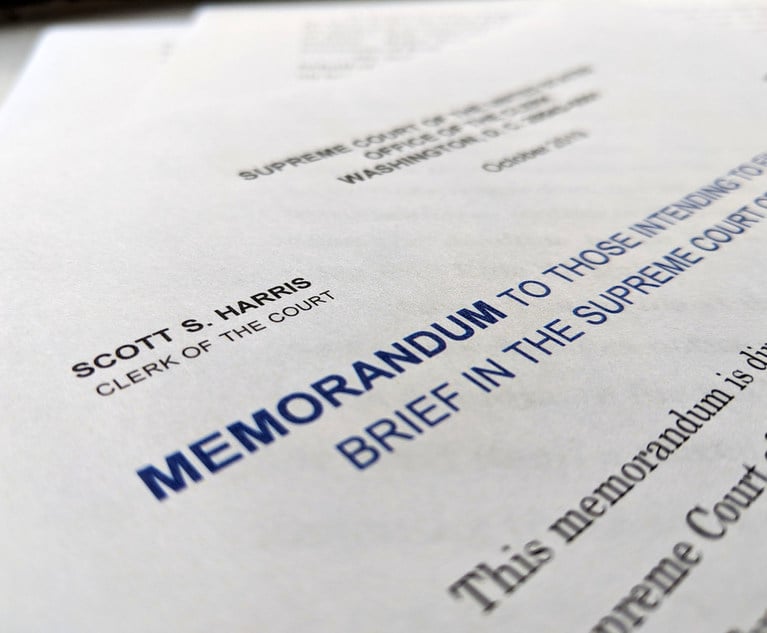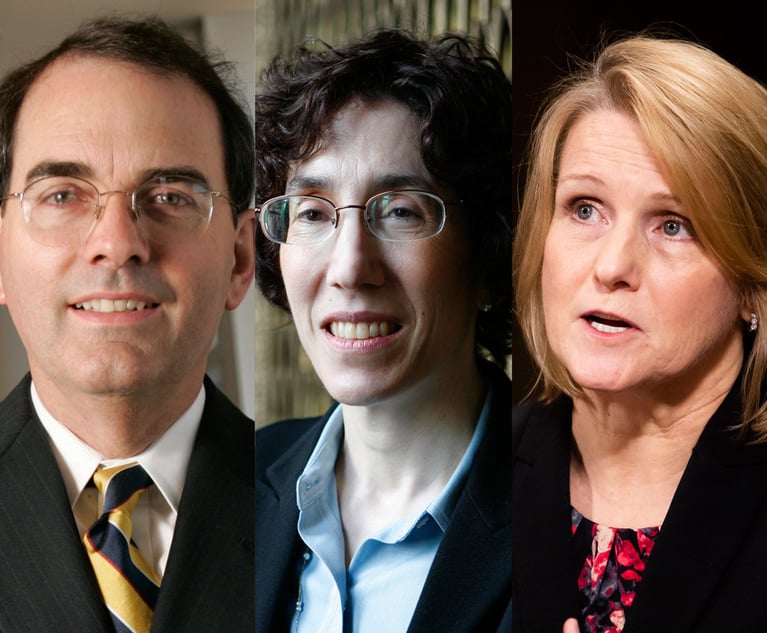DC Circuit Judge Warns Ruling Could 'Destabilize' Most Arbitration Awards
The U.S. Court of Appeals for the D.C. Circuit on Friday invoked a rare public-policy exception that "threatens to destabilize" arbitration awards in future cases, a federal appeals judge said in her dissent. "The court's decision to vacate the arbitral award in this case contradicts decades of precedent delineating a narrow public policy exception and threatens as a practical matter to destabilize many, if not most, arbitral awards," Judge Nina Pillard wrote.
April 28, 2017 at 05:19 PM
13 minute read
The U.S. Court of Appeals for the D.C. Circuit invoked a rare exception in a ruling Friday that “threatens to destabilize” arbitration awards in future cases, a federal appeals judge said in her dissent.
The D.C. Circuit, divided, ruled for the National Railroad Passenger Corp.—Amtrak—in a dispute over the firing of an officer named Sarah Bryant. An arbitrator said Bryant, fired for misconduct in 2012, should receive reinstatement, with back pay and lost seniority. A Washington federal trial judge later vacated that award.
Bryant, through the Fraternal Order of Police, appealed to the D.C. Circuit. The court was presented a conflict rooted in whether an Amtrak inspector general was bound to comply with certain procedures in the officer's collective bargaining agreement.
The arbitrator had said the internal investigation violated a part of the collective bargaining agreement that governs interrogations. Two judges on the D.C. Circuit panel, A. Raymond Randolph and Brett Kavanaugh, said Amtrak's inspector general's office was not bound by that rule in the agreement.
Judges don't have much flexibility when it comes to vacating arbitration awards. Randolph and Kavanaugh turned to one rarely used exception—for “public policy.” That exception gives judges the power to strike an award that is contrary to “law or public policy.”
The public policy exception has remained an open question in the courts. It has been called by some legal experts an amorphous and unruly caveat in arbitration disputes. The exception can overturn an arbitration award on grounds that it violates a law or compels an employer to violate a law.
Friday's ruling was the first time the D.C. Circuit has invoked the exception since the Supreme Court first described it decades ago. The high court itself has never used the exception and has opted to narrowly interpret the exception.
D.C. Circuit Judge Cornelia Pillard said in her dissent that the Amtrak case “does not come close to meriting such an extraordinary step” for a court to use the public policy exception to side with the Amtrak employee and potentially re-litigate an issue.
Pillard wrote in her dissent:
The court's decision to vacate the arbitral award in this case contradicts decades of precedent delineating a narrow public policy exception and threatens as a practical matter to destabilize many, if not most, arbitral awards. Indeed, its impact may well reach beyond labor arbitration to commercial arbitration under the Federal Arbitration Act.
Pillard argued the court should not relieve Amtrak of its obligation to comply with its collective bargaining agreement.
Randolph, writing for the majority, said the exception should be applied in Bryant's case because the court would essentially be enforcing an illegal contractual obligation. The inspector general should not have been restricted by any rules created in collective bargaining agreements to conduct investigations.
“An arbitration award may not be enforced if it transgresses well defined and dominant laws and legal precedents,” Randolph said in the opinion.
In her dissent, Pillard noted cases in which the Supreme Court declined to invoke the public policy exception in previous cases, including a case in which an operator of dangerous machinery was found with marijuana in a company parking lot and another in which male employees were given seniority over women in a contract agreement. She said in these cases the high court was bound to not second-guess the ways arbitrators handled the public policy issue at hand.
“As the Supreme Court envisioned it, the public policy exception would only be triggered by a public policy whose 'explicit, well defined and dominant' character could be ascertained by reference to laws and legal precedents,” she said.
Pillard said defining the rule in this case as ground for this exception “exceeds the scope” of the court's review.
“Today's decision invites litigation in every case in which a disappointed party to an arbitration case can base its own objection on some claim of error that places the awards at odds with law or public policy,” Pillard wrote. “Once arbitration becomes the state rather than the end of the dispute resolution process, it no longer serves the role Congress envisioned.”
The attorney for the Amtrak officer said he plans to request a review from the entire D.C. Circuit and plans to appeal to the U.S. Supreme Court in this case, if necessary.
“Allowing the panel's decision to stand would undermine nearly a century of jurisprudence under the Railway Labor Act,” Thomas Cushane of Cushane Law Firm, who argued for the Amtrak officer, said.
Thomas Reinert Jr. of Morgan, Lewis & Bockius, who represented Amtrak in the case, did not return messages seeking comment.
Related Articles:
|- CFPB Faces 'Rock and a Hard Place' in Pushing Arbitration Rule
- Dozens of Companies Await SCOTUS Ruling on Workplace Class-Action Bans
- Can Employers Ban Workers' Class Actions?
- Labor Regulators Urge DC Circuit to Uphold New 'Joint-Employer' Standard
- Rachel Brand, Chamber Lawyer Who Challenged Agencies, Prepares to Switch Sides
The U.S. Court of Appeals for the D.C. Circuit invoked a rare exception in a ruling Friday that “threatens to destabilize” arbitration awards in future cases, a federal appeals judge said in her dissent.
The D.C. Circuit, divided, ruled for the National Railroad Passenger Corp.—Amtrak—in a dispute over the firing of an officer named Sarah Bryant. An arbitrator said Bryant, fired for misconduct in 2012, should receive reinstatement, with back pay and lost seniority. A Washington federal trial judge later vacated that award.
Bryant, through the Fraternal Order of Police, appealed to the D.C. Circuit. The court was presented a conflict rooted in whether an Amtrak inspector general was bound to comply with certain procedures in the officer's collective bargaining agreement.
The arbitrator had said the internal investigation violated a part of the collective bargaining agreement that governs interrogations. Two judges on the D.C. Circuit panel,
Judges don't have much flexibility when it comes to vacating arbitration awards. Randolph and Kavanaugh turned to one rarely used exception—for “public policy.” That exception gives judges the power to strike an award that is contrary to “law or public policy.”
The public policy exception has remained an open question in the courts. It has been called by some legal experts an amorphous and unruly caveat in arbitration disputes. The exception can overturn an arbitration award on grounds that it violates a law or compels an employer to violate a law.
Friday's ruling was the first time the D.C. Circuit has invoked the exception since the Supreme Court first described it decades ago. The high court itself has never used the exception and has opted to narrowly interpret the exception.
D.C. Circuit Judge Cornelia Pillard said in her dissent that the Amtrak case “does not come close to meriting such an extraordinary step” for a court to use the public policy exception to side with the Amtrak employee and potentially re-litigate an issue.
Pillard wrote in her dissent:
The court's decision to vacate the arbitral award in this case contradicts decades of precedent delineating a narrow public policy exception and threatens as a practical matter to destabilize many, if not most, arbitral awards. Indeed, its impact may well reach beyond labor arbitration to commercial arbitration under the Federal Arbitration Act.
Pillard argued the court should not relieve Amtrak of its obligation to comply with its collective bargaining agreement.
Randolph, writing for the majority, said the exception should be applied in Bryant's case because the court would essentially be enforcing an illegal contractual obligation. The inspector general should not have been restricted by any rules created in collective bargaining agreements to conduct investigations.
“An arbitration award may not be enforced if it transgresses well defined and dominant laws and legal precedents,” Randolph said in the opinion.
In her dissent, Pillard noted cases in which the Supreme Court declined to invoke the public policy exception in previous cases, including a case in which an operator of dangerous machinery was found with marijuana in a company parking lot and another in which male employees were given seniority over women in a contract agreement. She said in these cases the high court was bound to not second-guess the ways arbitrators handled the public policy issue at hand.
“As the Supreme Court envisioned it, the public policy exception would only be triggered by a public policy whose 'explicit, well defined and dominant' character could be ascertained by reference to laws and legal precedents,” she said.
Pillard said defining the rule in this case as ground for this exception “exceeds the scope” of the court's review.
“Today's decision invites litigation in every case in which a disappointed party to an arbitration case can base its own objection on some claim of error that places the awards at odds with law or public policy,” Pillard wrote. “Once arbitration becomes the state rather than the end of the dispute resolution process, it no longer serves the role Congress envisioned.”
The attorney for the Amtrak officer said he plans to request a review from the entire D.C. Circuit and plans to appeal to the U.S. Supreme Court in this case, if necessary.
“Allowing the panel's decision to stand would undermine nearly a century of jurisprudence under the Railway Labor Act,” Thomas Cushane of Cushane Law Firm, who argued for the Amtrak officer, said.
This content has been archived. It is available through our partners, LexisNexis® and Bloomberg Law.
To view this content, please continue to their sites.
Not a Lexis Subscriber?
Subscribe Now
Not a Bloomberg Law Subscriber?
Subscribe Now
NOT FOR REPRINT
© 2024 ALM Global, LLC, All Rights Reserved. Request academic re-use from www.copyright.com. All other uses, submit a request to [email protected]. For more information visit Asset & Logo Licensing.
You Might Like
View All
Divided 5th Circuit Shoots Down Nasdaq Diversity Rules

Nevada Supreme Court to Decide Fate of Groundbreaking Contingency Cap Ballot Measure
5 minute read
Lawyers, Law Groups Oppose Proposal to Require Court Approval for Amicus Briefs

9th Circuit Judges Weigh if Section 230 Shields Grindr From Defective Design Claims
Trending Stories
Who Got The Work
Michael G. Bongiorno, Andrew Scott Dulberg and Elizabeth E. Driscoll from Wilmer Cutler Pickering Hale and Dorr have stepped in to represent Symbotic Inc., an A.I.-enabled technology platform that focuses on increasing supply chain efficiency, and other defendants in a pending shareholder derivative lawsuit. The case, filed Oct. 2 in Massachusetts District Court by the Brown Law Firm on behalf of Stephen Austen, accuses certain officers and directors of misleading investors in regard to Symbotic's potential for margin growth by failing to disclose that the company was not equipped to timely deploy its systems or manage expenses through project delays. The case, assigned to U.S. District Judge Nathaniel M. Gorton, is 1:24-cv-12522, Austen v. Cohen et al.
Who Got The Work
Edmund Polubinski and Marie Killmond of Davis Polk & Wardwell have entered appearances for data platform software development company MongoDB and other defendants in a pending shareholder derivative lawsuit. The action, filed Oct. 7 in New York Southern District Court by the Brown Law Firm, accuses the company's directors and/or officers of falsely expressing confidence in the company’s restructuring of its sales incentive plan and downplaying the severity of decreases in its upfront commitments. The case is 1:24-cv-07594, Roy v. Ittycheria et al.
Who Got The Work
Amy O. Bruchs and Kurt F. Ellison of Michael Best & Friedrich have entered appearances for Epic Systems Corp. in a pending employment discrimination lawsuit. The suit was filed Sept. 7 in Wisconsin Western District Court by Levine Eisberner LLC and Siri & Glimstad on behalf of a project manager who claims that he was wrongfully terminated after applying for a religious exemption to the defendant's COVID-19 vaccine mandate. The case, assigned to U.S. Magistrate Judge Anita Marie Boor, is 3:24-cv-00630, Secker, Nathan v. Epic Systems Corporation.
Who Got The Work
David X. Sullivan, Thomas J. Finn and Gregory A. Hall from McCarter & English have entered appearances for Sunrun Installation Services in a pending civil rights lawsuit. The complaint was filed Sept. 4 in Connecticut District Court by attorney Robert M. Berke on behalf of former employee George Edward Steins, who was arrested and charged with employing an unregistered home improvement salesperson. The complaint alleges that had Sunrun informed the Connecticut Department of Consumer Protection that the plaintiff's employment had ended in 2017 and that he no longer held Sunrun's home improvement contractor license, he would not have been hit with charges, which were dismissed in May 2024. The case, assigned to U.S. District Judge Jeffrey A. Meyer, is 3:24-cv-01423, Steins v. Sunrun, Inc. et al.
Who Got The Work
Greenberg Traurig shareholder Joshua L. Raskin has entered an appearance for boohoo.com UK Ltd. in a pending patent infringement lawsuit. The suit, filed Sept. 3 in Texas Eastern District Court by Rozier Hardt McDonough on behalf of Alto Dynamics, asserts five patents related to an online shopping platform. The case, assigned to U.S. District Judge Rodney Gilstrap, is 2:24-cv-00719, Alto Dynamics, LLC v. boohoo.com UK Limited.
Featured Firms
Law Offices of Gary Martin Hays & Associates, P.C.
(470) 294-1674
Law Offices of Mark E. Salomone
(857) 444-6468
Smith & Hassler
(713) 739-1250










